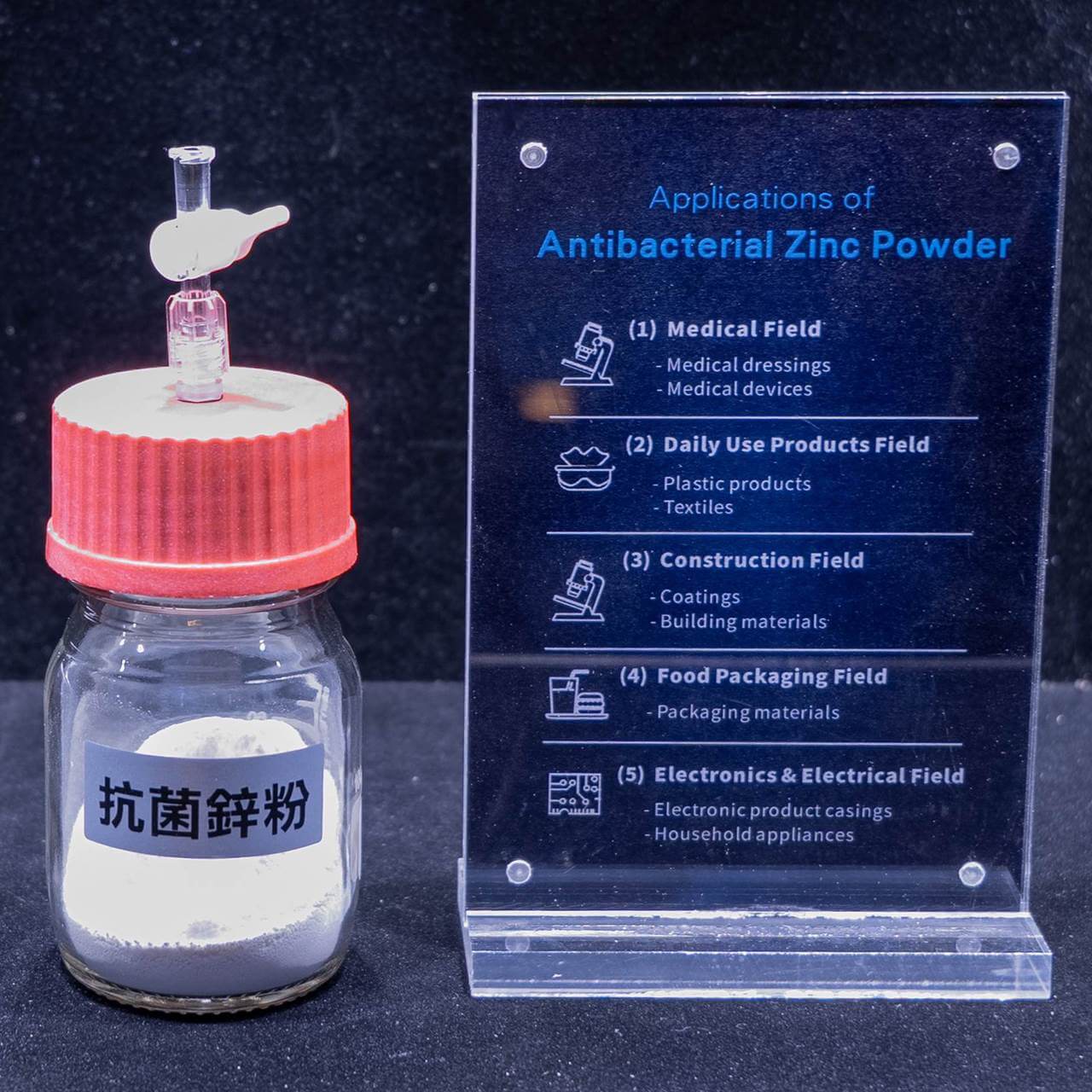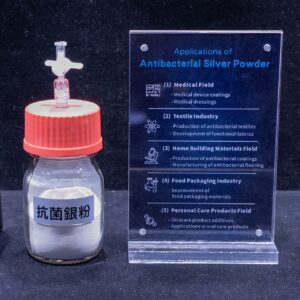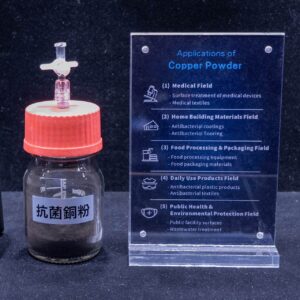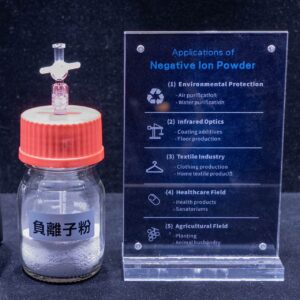Definition and Composition
Antibacterial zinc powder is a powder material primarily composed of metallic zinc, prepared through specific physical and chemical processing techniques. The core component is zinc, which is the key to its antibacterial function, relying on zinc and its released zinc ions to inhibit and kill microorganisms such as bacteria. In some production processes, trace amounts of other components may be added according to actual needs, such as additives that help control the release rate of zinc ions and enhance compatibility with base materials, but zinc remains the essential element.
Physical Properties
It appears as a silver-gray fine powder with a uniform color and a certain metallic luster. The particle size range is quite broad, with common micron-level and nanometer-level sizes. Nanometer-level antibacterial zinc powder has smaller particles and a larger specific surface area, resulting in higher antibacterial activity. However, it is prone to agglomeration and often requires special dispersion measures to ensure good dispersibility in practical applications. It has good fluidity and can be evenly dispersed in various carriers or base materials, with a moderate density and stable physical state at room temperature and pressure, making it convenient for storage and transportation.
Chemical Properties
The chemical nature is relatively active. Zinc, being a more reactive metal, readily reacts with acids, bases, and especially in the presence of water and oxygen, it gradually undergoes oxidation reactions and releases zinc ions, a process closely related to its antibacterial principle. Moreover, through chemical means, such as surface coating, using organic or inorganic compounds to coat the surface of zinc powder particles can regulate the release rate of zinc ions, improve its antioxidant properties, and enhance compatibility with other materials when mixed, thus better adapting to a variety of application scenarios.
Antibacterial Principle
The antibacterial action of antibacterial zinc powder mainly relies on the inhibitory and lethal mechanisms of zinc ions on bacteria. When antibacterial zinc powder is in the usage environment, zinc continuously releases zinc ions. These zinc ions absorb onto the surface of bacterial cell membranes, disrupt the integrity of the cell membranes, causing the outflow of substances inside the cells, and interfere with the enzyme activity and metabolic processes inside the bacteria, preventing bacteria from growing and reproducing normally. Under a certain concentration of zinc ions, bacteria can even be directly killed. If there are releasable zinc ions in the environment, it can continuously exert antibacterial effects, showing long-term antibacterial characteristics.
Safety and Stability
Under the premise of following relevant usage specifications and addition standards, antibacterial zinc powder is a relatively safe material. For example, when applied to daily necessities and medical supplies that are in close contact with the human body, if the specified amount is added, it usually does not pose a threat to human health. In terms of stability, its antibacterial performance can remain relatively stable within a certain period. However, as zinc ions are continuously released and consumed, and with prolonged exposure to external environmental factors (such as temperature, humidity, etc.), the antibacterial effect will gradually weaken. Nevertheless, by reasonably designing product formulas, controlling the usage environment, and replenishing in time, a better antibacterial effect can be maintained for a longer period.
Application Scenarios
Medical Field
Medical dressingsAdding antibacterial zinc powder to medical gauze, band-aids, bandages, and other dressings can effectively inhibit the proliferation of bacteria around wounds, reducing the risk of wound infection and creating a relatively sterile environment conducive to wound healing. It is especially suitable for the care of wounds that are prone to infection, such as burns, trauma, and surgical incisions, helping wounds to heal faster and better.
Medical devices
For medical devices implanted in the human body, such as orthopedic implants (bone nails, bone plates, etc.), cardiovascular stents, and external devices like catheters and syringes, preparing coatings containing antibacterial zinc powder on their surfaces can prevent bacteria from adhering and proliferating on the device surfaces, greatly reducing infection complications caused by medical devices, improving the safety and effectiveness of device use, extending the service life of medical devices, and ensuring patient health.
Daily Necessities Field
Plastic productsAdding antibacterial zinc powder in the production process of household plastic products, such as trash cans, plastic tableware, storage boxes, etc., can endow these plastic products with antibacterial functions, inhibiting the proliferation and spread of common bacteria in daily life on their surfaces, maintaining the cleanliness and hygiene of plastic products, reducing the health risks of bacterial transmission to humans, and helping to create a healthy home living environment.
Textiles
Adding antibacterial zinc powder in the production of socks, underwear, pajamas, towels, and other textiles can give textiles antibacterial and deodorizing characteristics, inhibiting bacteria caused by human sweating and secretions, reducing the production of odors, improving the comfort of wearing or use, and benefiting skin health, especially suitable for people with sensitive skin.
Building Field
CoatingsAdding antibacterial zinc powder to interior and exterior wall coatings, after the coatings are applied to the walls, antibacterial zinc powder can inhibit the growth and reproduction of microorganisms such as mold and bacteria on the walls, preventing phenomena such as wall mold, discoloration, and peeling, extending the aesthetic and service life of the walls. The effect is more significant in damp places prone to bacterial growth, such as kitchens, bathrooms, and basements, effectively improving indoor environmental quality.
Building materials
Incorporating antibacterial zinc powder into the production of antibacterial tiles, antibacterial flooring, and other building materials can enhance the antibacterial properties of these materials, reducing the proliferation of bacteria and mold in indoor environments, creating a healthier and more comfortable living space, and reducing the potential health threats to residents caused by microbial growth.
Food Packaging Field
Packaging materialsApplying antibacterial zinc powder to food packaging bags, boxes, and cling film can inhibit the proliferation of bacteria on the packaging surface, preventing bacterial contamination of food, helping to extend the shelf life of food, ensuring the quality and safety of food in storage, transportation, and sales, and reducing food spoilage caused by bacterial growth on the packaging surface.
Electronic and Electrical Field
Electronic product casingsAdding antibacterial zinc powder to the casing materials of electronic products such as mobile phones, tablets, and laptops can prevent bacteria carried on users’ hands from adhering to and proliferating on the casings, maintaining the cleanliness and hygiene of the appearance of electronic products, and also enhancing the overall hygiene performance of the products, meeting the current consumers’ demand for healthy use of electronic products.
Appliances
In appliances such as refrigerators, washing machines, and air conditioners, using materials containing antibacterial zinc powder in their casings or internal parts that meet the outside world can inhibit bacterial proliferation. For example, refrigerators are less likely to produce odors, washing machines can reduce secondary pollution to clothes, and the air blown out by air conditioners is relatively cleaner, thereby improving the usage experience and hygiene conditions of appliances.





